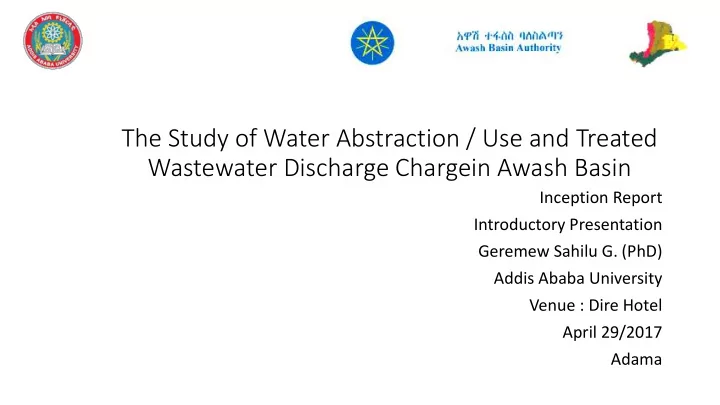

The Study of Water Abstraction / Use and Treated Wastewater Discharge Chargein Awash Basin Inception Report Introductory Presentation Geremew Sahilu G. (PhD) Addis Ababa University Venue : Dire Hotel April 29/2017 Adama
OUTLINE • BACKGROUND • OBJECTIVES • METHODOLOGIES • DELIVERABLES • WORK PLAN
Ethiopia's National Population Growth (1900 - 2013) 100000 Population in Thousand 80000 POPULATION 60000 MOSTLY RURAL PRESSURE!! 40000 ETHIOPIA - 80% 20000 0 Source : CSA & Bielli ethal (2001) Year 1900191019201930194019501960197019801990199520052013
Still Very High Potential of Population Increase in the Coming Decades (High Proportion of Young Population)
Ethiopia’s GDP Annual Growth Rate More than decade of Stable Economic Development
Existing/Planned In Industrial Park rks
Implications of Industrial Expansion on Water Resources Increasing Water Use Scarcity ??? Increasing Wastewater
1. A few Points ! FACT : Water Abstraction/Use and Treated Wastewater Discharge charge mechanisms is critical issues for future water resources management and sustainable development. SITUATIONS : In Ethiopia, there is no clear water codes, policies, incentives and enforcement mechanisms on water saving practices. Efficient Water charge is a remedy for such problems. NOW : Recognizing water and Wastewater Discharge charge play a central role in establishing good water governance in the basin Our Appreciation Goes to … the AwBA & & MoWIE
Awash Basin – Basic Facts -1/10 Of Countries Area -1/6 of National Population (15 million) -35% Urban Population (National avg. < 20) -60% of the National Industry Located - Approx. 200,000 ha irrigated area - Water Potential approx 5 billion m 3 /year - Annual Per capita Water Potential < 350 m 3 /person/per year < 1000 m 3 /person/year (Water Scarce Category – Lower End)
The Problem (in Awash Basin) • Scarcity of Water Demanding Efficient Use • Water Use in the basin for various uses but no systematic tariff for water abstraction for the various purposes • Basin the most urbanized/industrialized but there is no system to charge “treated” wastewater – Hence depletion of fresh water use • Presence of rural and water supply tariff for the end user and some national guideline but absence of water use/abstraction tariff from source • Presence of a number of policies regarding water and wastewater issues but no systematic water tariff system with which basin authorities administer the basin • Governance issues considering federal and regional jurisdictions. Etc.
Objective • The general objective of the water tariff study is: • to develop suitable, appropriate and implementable water use/abstraction charge and a national guideline • for the implementation of pertinent water resources management, polices, proclamations and regulatio ns • within the framework of Integrated Water resources management (IWRM) principles.
WATER USE/ABSTRACTION & TREATED WASTEWATER DISCHARGE Tariff Setting Tariff Guidelines
Methodology • Approach /Pillars • Organizational Frameworks • Study Team Composition
Institution� /� Governance� � Basin� � Authority� � � � R Water� � Sustainable� e Abstraction� � s Water� Resources� Tariff� o � Management� � F u � r i � c n � Water� e� a � Utility/Water� � n & � Committees/� c � � Direct� Water� e� I � Users� n � Water� f Water� Use� � Infrastructure� r Tariff� � a Development� � s and� � t � Management� r � u � c � t u Water� User� � r � e� � � � Fig.� 1� � Three� Pillars� for� Water� Abstraction/Use� Tariff� Setting� �
� Project� Team� Leader� � Dr.-Ing.� Geremew� Sahilu� � WP2� (Irrigation) � WP3� (Domestic� and� Non-Domestic� 1. Dr.-� Ing.� Dereje� Hailu� Water� Supply)� 1. Dr.-� 2. Dr.� Daniel� F/Sillasie � Ing.� Geremew� Sahilu� 2. Dr.� 3. Dr.� Yenesew� Mengistae� Esubalew� Abate� 4. Assitant� 1/2� 3. Dr.� Mebrouk� Mohammed� � 4. Ato� Dereje� Tadesse� 5. Ato� Mekonnen� Mulleta� 6. Assitant� 1/2� WP1� (Socio-economic� /Regulatory� FW)� 7. Assistant� 1/2� � 1. Dr.� Azage� G/Yohannes� 2. Dr.� Bayou� Chane� WP2/5� WP3/4� 3. Dr.� Woldeab� Teshome� 1. Economist� 1. Economist� 4. Associate� Prof� Mekete� Bekele� 2. Sociologist� 2. Sociologist� 5. Dr.� Tesfayae� Zeleke� � � 6. Dr.� Yakob� Arsano� 7. Dr.� Nigussie� Semie� 8. Ato� Marshal� Nigussie� (PhD� Cand.)� WP5 (Hydropower,� Recreation … ) � WP4� (Domestic� and� Industrial� 1. Dr.� Yilma� Sileshi� Wastewater� Discharge) � 2. Dr.� 1. Dr.� Abebe� Getahun� Agizew� Nigussie� 2. Dr.� 3. Ato� Fitsum� Teshome� Asei� Kemal� 4. W/rt� Dure� Mulatu� � 3. Dr.� Mebrate� Taffesse� 4. Ato� Zerihun� Abate� 5. Assistant� 1/2� 6. Assistant� 1/2� Project� Deliverables� Water� Abstraction� /� Use� and� Treated� Wastewater� Discharge� Fee�
Study Team Composition • The Study Team is composed of Professionals from various Colleges/ Institutes of Addis Ababa University (AAU) • Addis Ababa Institute of Technology (AAiT) (Lead) • Ethiopian Institute of Water Resources (EiWR) • College of Social Sciences (CSS) • College of Business and Economics (CBE) • College of Development Studies (CDS) • College of Law and Governance (CLG)
Deliverables / Schedule S.no Activities Months . 1 2 3 4 5 6 7 8 9 10 11 12 1 Inception report 2 Interim Report 1 3 Interim Report 2 4 Draft Water Tariff Report 5 Final Water Tariff Report 6 Draft Water use tariff guideline 7 Training 8 Final Water use tariff guideline report and Dissemination Workshop
Presentation of Work Packages Work Description Presentors Packages WP2 Tariff Setting for Irrigation Water Dr. Dereje Hailu Abstraction/Use WP 3 Tariff Setting for Domestic and Non- Ato Dereje Tadesse Domestic Water Supply WP 4 Tariff Setting fro Treated Wasstewater Dr. Asei Jabir Discharge WP5 Tariff Setting for hydropower, Dr. Yilma Sileshi aquaculture and recreation WP1 Socio-economic analysis, regular Dr. Azage G/Yohannes framework and Institutional Arrangements
THANK YOU !!! 23
Recommend
More recommend